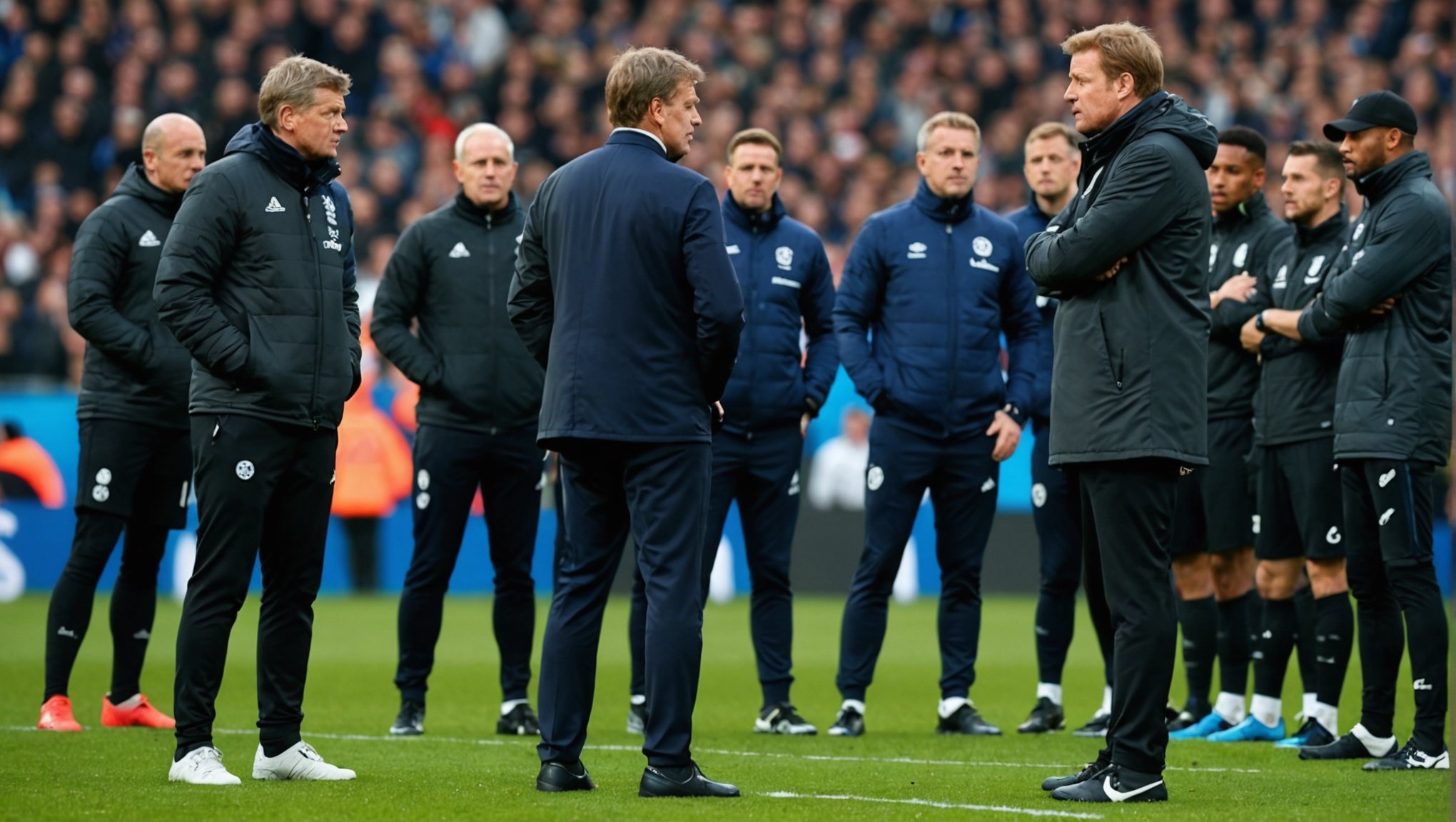Navigating Media Pressure: Strategies for Football Managers Post-Controversial Game Decisions
Managing a football team is a high-stakes job, especially when it comes to dealing with the intense media scrutiny that follows every game, particularly those involving controversial decisions. Football managers must navigate this pressure cooker environment with finesse, ensuring that their team’s performance and morale are not adversely affected. Here’s a detailed look at the strategies football managers can employ to handle media pressure effectively.
Understanding the Media Landscape
In the world of football, the media plays a pivotal role in shaping public opinion and influencing the narrative around a team’s performance. Managers need to be aware of the different types of media they will encounter and how to engage with them constructively.
Also read : Mastering Squad Rotation: Strategies for Football Coaches During Busy Fixture Periods
The Power of the Press
The English press, for instance, is notorious for its tough stance on national team managers. Thomas Tuchel, who is set to become the new England manager, has already faced significant media scrutiny in his previous roles, particularly during his time at Chelsea and PSG. His past tensions with the media could pose a challenge in his new role, highlighting the need for effective media management skills[1].
Social Media and Public Opinion
In today’s digital age, social media amplifies every move a football manager makes. Jayden Daniels, the quarterback for the Washington Commanders, has learned to navigate this landscape by tuning out the noise and focusing on his performance on the field. For football managers, this means being aware of the constant scrutiny and learning to filter out the distractions[5].
Have you seen this : Unlocking Player Engagement: Innovative Strategies for Football Coaches to Create Dynamic Training Sessions
Building a Strong Media Relationship
A good relationship with the media can be a powerful tool for football managers. Here are some strategies to build and maintain this relationship:
Transparency and Honesty
Being transparent and honest in media interactions can go a long way in building trust. When Jason Kelce, the retired NFL player, found himself in a reputational crisis, he took to his podcast and ESPN to address the situation honestly. He admitted his actions were wrong and expressed his regrets, which helped in mitigating the damage[2].
Consistent Communication
Consistent communication is key. Managers should have a clear and consistent message that they convey across all media platforms. This helps in managing expectations and reducing speculation.
Media Training
Media training is essential for football managers. It helps them prepare for the types of questions they might face and how to respond effectively. Here are some tips for media training:
- Prepare for Tough Questions: Anticipate the tough questions and have well-thought-out responses.
- Stay Calm Under Pressure: Maintain composure, even when faced with aggressive questioning.
- Focus on the Message: Stick to the key message and avoid getting sidetracked.
- Show Empathy: Understand the perspective of the fans and the media.
Managing Controversy and Criticism
Controversial game decisions are inevitable, and how managers handle them can make or break their reputation.
Acknowledging Mistakes
When mistakes are made, it is crucial to acknowledge them promptly. Peter Vermes, the manager of Sporting Kansas City, reflects on his own performance and that of his team, emphasizing the importance of taking responsibility for mistakes. This approach helps in maintaining credibility and trust with the fans and the media[3].
Defusing Criticism
Criticism is part of the job, and managers need to learn how to defuse it effectively. Here are some strategies:
- Address the Issue Directly: Do not avoid the controversy; address it head-on.
- Provide Context: Explain the reasoning behind the decision.
- Show Commitment to Improvement: Assure that steps are being taken to prevent similar mistakes in the future.
The Role of Data Analysis in Decision Making
Data analysis is becoming increasingly important in football, helping managers make informed decisions that can withstand media scrutiny.
Using Data to Support Decisions
Data analysis can provide a solid foundation for decision-making. For example, in the Premier League, teams like Manchester City and Manchester United use extensive data analysis to optimize their strategies. This data can be used to explain decisions to the media and fans, adding a layer of credibility.
| Team | Data Analysis Tools | Impact on Decision Making |
|---|---|---|
| Manchester City | Advanced player tracking, match analytics | Optimizes player selection, tactics, and in-game adjustments |
| Manchester United | Statistical analysis of player performance, opposition analysis | Informs transfer decisions, game strategies, and player development |
| Chelsea | Detailed tactical analysis, player metrics | Enhances team performance, aids in identifying areas for improvement |
Theoretical Framework
A theoretical framework for decision-making can also be beneficial. This involves understanding the long-term goals of the club and aligning short-term decisions with these goals. Here are some key points:
- Long-Term Vision: Ensure that every decision aligns with the club’s long-term vision.
- Performance Metrics: Use performance metrics to evaluate the effectiveness of decisions.
- Feedback Loop: Establish a feedback loop to continuously improve decision-making processes.
Building a Strong Team Culture
A strong team culture can help managers navigate media pressure more effectively.
Player Development and Morale
Developing young players and maintaining the morale of the team is crucial. Thomas Tuchel’s ability to integrate youth players with seasoned stars at Chelsea is a good example. This approach not only improves team performance but also fosters a positive team culture that can withstand external pressures[1].
Coaching Staff and Medical Team
The coaching staff and medical team play critical roles in maintaining team performance. As the season progresses, different members of the team take on greater responsibility. For instance, during the finals, the medical team and rehab staff become crucial in ensuring players are at their best[4].
Practical Insights and Actionable Advice
Here are some practical insights and actionable advice for football managers navigating media pressure:
Stay Focused on the Game
- Tune Out the Noise: Focus on the game and the team’s performance rather than getting distracted by media speculation.
- Maintain Consistency: Consistency in messaging and actions helps in building trust with the media and fans.
Engage Constructively with the Media
- Be Transparent: Be honest and transparent in media interactions.
- Prepare Thoroughly: Prepare for media interactions by anticipating questions and having well-thought-out responses.
Use Data to Your Advantage
- Leverage Data Analysis: Use data analysis to support your decisions and explain them to the media and fans.
- Continuously Improve: Use a feedback loop to continuously improve decision-making processes.
Navigating media pressure is an integral part of being a football manager. By understanding the media landscape, building strong media relationships, managing controversy effectively, using data analysis, and fostering a strong team culture, managers can mitigate the negative impacts of media scrutiny and focus on what really matters – the performance of their team.
As Gary Neville, the former Manchester United player and current pundit, once said, “The key to handling media pressure is to stay focused on your goals and not let the noise distract you.” By following these strategies, football managers can ensure that their teams perform at their best, even in the most intense media environments.











